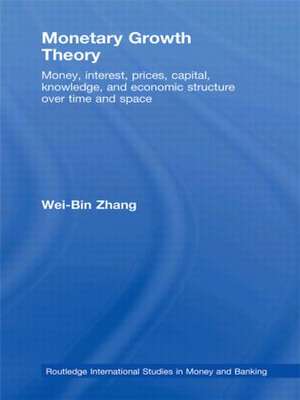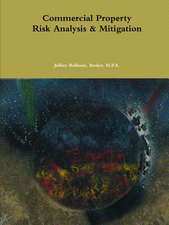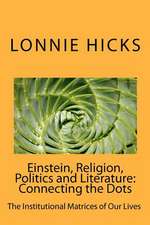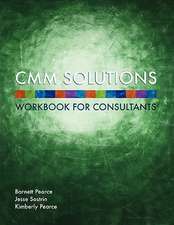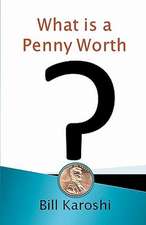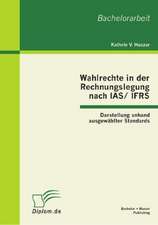Monetary Growth Theory: Money, Interest, Prices, Capital, Knowledge and Economic Structure over Time and Space: Routledge International Studies in Money and Banking
Autor Wei-Bin Zhangen Limba Engleză Paperback – 15 apr 2010
Zhang’s book will appeal to those studying monetary economics, neoclassical growth theory, development economics and international economics. It is also useful more generally, for researchers in social sciences with an interest in the role of money in modern societies.
| Toate formatele și edițiile | Preț | Express |
|---|---|---|
| Paperback (1) | 428.40 lei 6-8 săpt. | |
| Taylor & Francis – 15 apr 2010 | 428.40 lei 6-8 săpt. | |
| Hardback (1) | 1124.73 lei 6-8 săpt. | |
| Taylor & Francis – 23 iul 2008 | 1124.73 lei 6-8 săpt. |
Din seria Routledge International Studies in Money and Banking
-
 Preț: 325.16 lei
Preț: 325.16 lei -
 Preț: 313.60 lei
Preț: 313.60 lei -
 Preț: 284.40 lei
Preț: 284.40 lei -
 Preț: 341.55 lei
Preț: 341.55 lei -
 Preț: 311.41 lei
Preț: 311.41 lei -
 Preț: 309.94 lei
Preț: 309.94 lei -
 Preț: 307.47 lei
Preț: 307.47 lei -
 Preț: 313.17 lei
Preț: 313.17 lei - 9%
 Preț: 864.83 lei
Preț: 864.83 lei -
 Preț: 664.76 lei
Preț: 664.76 lei - 18%
 Preț: 1056.00 lei
Preț: 1056.00 lei - 18%
 Preț: 1175.01 lei
Preț: 1175.01 lei - 18%
 Preț: 1122.64 lei
Preț: 1122.64 lei - 24%
 Preț: 148.98 lei
Preț: 148.98 lei - 18%
 Preț: 1067.14 lei
Preț: 1067.14 lei - 25%
 Preț: 503.80 lei
Preț: 503.80 lei - 18%
 Preț: 1058.79 lei
Preț: 1058.79 lei - 26%
 Preț: 820.40 lei
Preț: 820.40 lei - 18%
 Preț: 1058.79 lei
Preț: 1058.79 lei - 28%
 Preț: 821.46 lei
Preț: 821.46 lei - 18%
 Preț: 1057.40 lei
Preț: 1057.40 lei - 26%
 Preț: 765.01 lei
Preț: 765.01 lei - 18%
 Preț: 1056.28 lei
Preț: 1056.28 lei - 15%
 Preț: 254.03 lei
Preț: 254.03 lei - 18%
 Preț: 1064.70 lei
Preț: 1064.70 lei - 18%
 Preț: 1056.00 lei
Preț: 1056.00 lei - 18%
 Preț: 1113.25 lei
Preț: 1113.25 lei - 18%
 Preț: 702.31 lei
Preț: 702.31 lei - 18%
 Preț: 1166.68 lei
Preț: 1166.68 lei - 26%
 Preț: 849.37 lei
Preț: 849.37 lei - 18%
 Preț: 1116.38 lei
Preț: 1116.38 lei - 25%
 Preț: 851.99 lei
Preț: 851.99 lei - 18%
 Preț: 1060.87 lei
Preț: 1060.87 lei - 25%
 Preț: 823.57 lei
Preț: 823.57 lei - 18%
 Preț: 1114.70 lei
Preț: 1114.70 lei - 25%
 Preț: 824.53 lei
Preț: 824.53 lei - 29%
 Preț: 1188.26 lei
Preț: 1188.26 lei - 25%
 Preț: 853.07 lei
Preț: 853.07 lei - 18%
 Preț: 1114.30 lei
Preț: 1114.30 lei -
 Preț: 418.22 lei
Preț: 418.22 lei - 30%
 Preț: 854.10 lei
Preț: 854.10 lei - 18%
 Preț: 1060.25 lei
Preț: 1060.25 lei - 18%
 Preț: 1165.73 lei
Preț: 1165.73 lei - 30%
 Preț: 851.82 lei
Preț: 851.82 lei - 18%
 Preț: 1059.48 lei
Preț: 1059.48 lei - 18%
 Preț: 1240.95 lei
Preț: 1240.95 lei - 26%
 Preț: 1187.46 lei
Preț: 1187.46 lei - 18%
 Preț: 1341.98 lei
Preț: 1341.98 lei - 15%
 Preț: 698.43 lei
Preț: 698.43 lei
Preț: 428.40 lei
Nou
Puncte Express: 643
Preț estimativ în valută:
81.97€ • 85.82$ • 67.83£
81.97€ • 85.82$ • 67.83£
Carte tipărită la comandă
Livrare economică 05-19 aprilie
Preluare comenzi: 021 569.72.76
Specificații
ISBN-13: 9780415588720
ISBN-10: 0415588723
Pagini: 396
Ilustrații: 107 Line drawings, black and white; 2 Tables, black and white; 107 Illustrations, black and white
Dimensiuni: 156 x 234 x 21 mm
Greutate: 0.74 kg
Ediția:1
Editura: Taylor & Francis
Colecția Routledge
Seria Routledge International Studies in Money and Banking
Locul publicării:Oxford, United Kingdom
ISBN-10: 0415588723
Pagini: 396
Ilustrații: 107 Line drawings, black and white; 2 Tables, black and white; 107 Illustrations, black and white
Dimensiuni: 156 x 234 x 21 mm
Greutate: 0.74 kg
Ediția:1
Editura: Taylor & Francis
Colecția Routledge
Seria Routledge International Studies in Money and Banking
Locul publicării:Oxford, United Kingdom
Public țintă
Postgraduate and UndergraduateCuprins
1. Money and Growth Theory, 1.1 Money in Economic Growth Theory, 1.2 The One-Sector Growth (OSG) Model, 1.3 The OSG Model with the Cobb-Douglas Functions, 1.4 Theoretical Foundations of the Utility Function, 1.5 The Keynesian Consumption Function and the OSG Approach, 1.6 The Solow Growth Model and the OSG Approach, 1.7 The Ramsey Growth Model and the OSG Approach, 1.8 The Structure of the Book, 2 Money as a Store of Value, 2.1 The Tobin Monetary Growth Model, 2.2 Growth with Inflationary Finance, 2.3 A Portfolio Balance Growth Mode, 2.4 Monetary Growth with Two Types of Households, 2.5 A Two-Sector Monetary Growth Model, 2.6 Money as a Store of Value, 3 Money in Utility and Production Functions, 3.1 The Levhari and Patinkin Approach, 3.2 The Sidrauski Model and Its Variations, 3.3 The One-Sector MIUF-OSG Model, 3.4 A Growth Economy with Two Types of Households, 3.5 A Portfolio Balance MIUF-OSG Growth Model, 3.6 Growth with Capital Accumulation and Education, 3.7 The MIPF Approach, 3.8 Further Issues, 4 Money-in-Advance Growth Models, 4.1 A CIA-OSG Growth Model, 4.2 A CIA Two-Sector Model, 4.3 Monetary Policy in a CIA Economy, 4.4 Home Production in the CIA-OSG Model, 4.5 Growth with Learning by Doing and Research, 4.6 Money, Public Goods and Returns to Scale, 4.7 A Shopping Cost Model in the Ramsey Approach, 4.8 Concluding Remarks, 5 Unemployment and Inflation, 5.1 A Traditional Model of Inflation and Unemployment, 5.2 The IS-LM Model for a National Economy, 5.3 A Monetary Growth Welfare Economy with MIUF Approach, 5.4 Money, the Efficiency Wage Theory and the MIUF Approach, 5.5 Other Causes of Unemployment, 6 Preference Change and Habit Formation, 6.1 Uzawa’s Preference Change in the Ramsey Approach, 6.2 The CIA-OSG Model with Preference Change, 6.3 The MIUF-OSG Model with Preference Change, 6.4 A Two-Sector Two-Group Monetary Growth Model with Consumer Durables, 6.5 Habit Formation in the Ramsey Approach, 7 Monetary Growth with Urban Structure, 7.1 The Monetary Urban Growth Model, 7.2 The Dynamics of the Non-monetary Economy, 7.3 The Dynamics of the Monetary Economy, 7.4 Concluding Remarks, 8 Money in Multi-Regional Growth Economies, 8.1 The Two-region Monetary Growth Model, 8.2 The Dynamics of the Non-monetary Economy, 8.3 The Dynamics of the Monetary Economy, 8.4 Conclusions, 9 Money, Growth and International Trade, 9.1 A Classical Monetary Trade Model, 9.2 Dornbush’s Exchange Rate Model for a Small Economy, 9.3 A Small Open-Country Economy with the CIA Approach, 9.4 A Small Open-Country Economy with the MIUF Approach, 9.5 A Multi-Country Economic Model, 9.6 Money, Capital, Knowledge, Trade, and Growth, 10 Money and Economic Complexity
Notă biografică
Wei-Bin Zhang is Professor at Ritsumeikan Asia Pacific University, Japan.
Descriere
Many economic dynamic models omit monetary issues by assuming that transactions on the economy’s real side can be carried out without money. This book answers some challenging questions in monetary growth theory within a compact theoretical framework.
